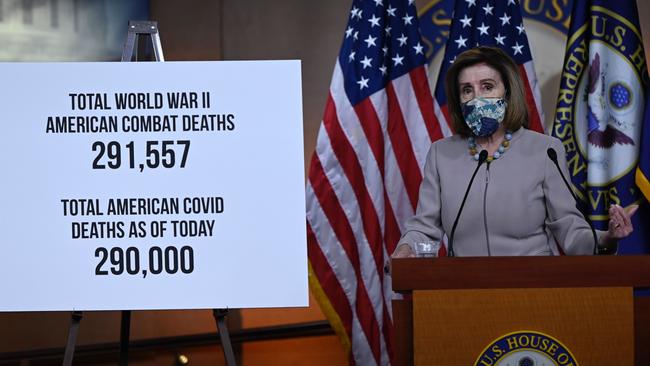Coronavirus: US vaccine coming as cases soar
The approval of the Pfizer vaccine was a bittersweet moment for many Americans, who fear it won’t reach them in time.
The momentous decision by the US drug agency to recommend that Pfizer’s COVID-19 vaccine be approved for use was a bittersweet moment for Americans.
It means that Americans will almost certainly begin receiving coronavirus vaccinations from early next week, with the Federal Drug Administration expected to accept its advisory board’s advice and approve the vaccine for use within days.
While this marks the beginning of the end of the pandemic, it will come too late for more than 100,000 Americans who are expected to become infected and die in the next few months before the vaccine reaches them.
The 23-member board voted by a 17-4 majority, with one formally abstaining, that “on the totality of scientific evidence available” the benefits of the Pfizer vaccine “outweighed its risks for use in individuals 16 years of age and older”.

The news comes as the country is living through an ever-escalating health nightmare that is toppling grim new milestones each day.
Within days the death toll will top 300,000, dwarfing that of any other country.
This week saw a daily record with 3253 deaths on Thursday AEDT and a record number of 106,219 people in hospital with COVID.
The total number of coronavirus infections also passed 15 million this week, with daily new infections running at a record average of more than 210,000 a day, four times the level in mid-October.
Experts have described the rapid spread of the virus as a “surge upon a surge” as a deadly combination of Thanksgiving holiday travel, colder weather and virus fatigue fuels an unprecedented spread.
This latest giant surge is taking place across the whole country, unlike the earlier and smaller outbreaks in April and then in July that were localised in the northeast and then in the sunbelt, respectively.
Hospitals in many states, including New Mexico, North Dakota and parts of Georgia, have run out of intensive care beds.
In New Mexico, the situation is so dire that Governor Michelle Grisham is expected to announce that doctors can ration care for patients based on who is most likely to survive.
“We are in a totally unprecedented health crisis in this country,” former health and human services secretary Kathleen Sebelius said.
“The disease is everywhere — Midwest, west coast, east coast, north, south. Healthcare workers are exhausted. Hospitals are totally full.”

The FDA’s advisory board, which includes scientists, doctors, and pharmaceutical representatives, met all day on Friday AEDT to consider the safety of the Pfizer vaccine, which has already been cleared for use in Britain, Canada and Saudi Arabia.
The approval within days of the Pfizer vaccine by the FDA is expected to be followed next week by FDA approval of the vaccine produced by US biotech company Moderna.
The moves will trigger one of the largest rollouts of any vaccine in history as the US seeks to vaccinate as many of its 330 million people as quickly as it possibly can.
But the effort is already being hampered by uncertainty over supplies and over who should be prioritised for the vaccine.
Federal guidelines say that elderly people in nursing homes and frontline healthcare workers should receive the vaccine first.
But there has been no clear determination on which segments of society should receive preference after that, with elderly America, federal workers, essential workers and transit employees all in the mix for an early jab.
States will decide the order in which vaccinations are given.
Polls show that between one quarter and one third of Americans say they will not get a vaccine when it becomes available because of concerns about its safety.
It is expected that those Americans who are under 60 and do not have underlying health conditions will have to wait until at least May or June to receive a vaccine.
President-elect Joe Biden says he will recommend masks be worn across the country for the first 100 days of his administration.
Cameron Stewart is also US contributor for Sky News Australia.






To join the conversation, please log in. Don't have an account? Register
Join the conversation, you are commenting as Logout